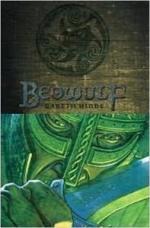|
This section contains 7,076 words (approx. 24 pages at 300 words per page) |

|
SOURCE: “Beowulf and the Judgement of the Righteous,” in Learning and Literature in Anglo-Saxon England, edited by Michael Lapidge and Helmut Gneuss, Cambridge University Press, 1985, pp. 393-407.
In the following essay, Greenfield maintains that the Christian author of Beowulf viewed the heroic society of the poem sympathetically and recognized the ethical and social values of that world. Furthermore, Greenfield contends, the poet humanized Beowulf—for example, by making his judgement fallible—in order to elicit a more emotional response from the audience.
When Beowulf utters his last words on earth, the poet comments,
him of hræðre gewat sawol secean soðfæstra dom.(1)
(2819b-20)
Despite some critical attempts to find these lines ambiguous, they seem to state unequivocally that the hero's soul has found salvation.2 Wiglaf seems equally certain that his lord's soul will find its just reward:
Sie sio bær gearo ædre geæfned, þonne...
|
This section contains 7,076 words (approx. 24 pages at 300 words per page) |

|


